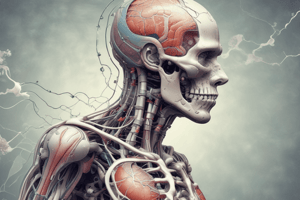Podcast
Questions and Answers
How does fluoride in toothpaste help prevent dental caries formation?
How does fluoride in toothpaste help prevent dental caries formation?
- Fluoride strengthens the enamel by forming fluorapatite, making it more resistant to acid attack. (correct)
- Fluoride inhibits the absorption of calcium in the teeth, making them more resistant to decay.
- Fluoride kills all bacteria in the mouth, preventing plaque formation.
- Fluoride decreases saliva production, preventing bacteria growth.
What is a primary role of iron in the human body?
What is a primary role of iron in the human body?
- Transports oxygen in the blood as part of hemoglobin. (correct)
- Acts as a cofactor for vitamin D synthesis.
- Neutralizes free radicals in cells.
- Regulates calcium absorption in the gut.
Which factor is known to enhance iron absorption in the gut?
Which factor is known to enhance iron absorption in the gut?
- Phytates in food.
- Vitamin C consumption. (correct)
- Presence of non-heme iron.
- High calcium intake.
What is the main distinction between ferritin and transferrin?
What is the main distinction between ferritin and transferrin?
Why is iodine considered an essential nutrient in the diet?
Why is iodine considered an essential nutrient in the diet?
Which condition is characterized by delayed physical and mental development due to iodine deficiency?
Which condition is characterized by delayed physical and mental development due to iodine deficiency?
What term describes abnormally high levels of sodium in the blood?
What term describes abnormally high levels of sodium in the blood?
Which cation is predominantly found inside cells?
Which cation is predominantly found inside cells?
What is the primary function of ferritin in the body?
What is the primary function of ferritin in the body?
Which hormone plays a significant role in increasing blood calcium levels?
Which hormone plays a significant role in increasing blood calcium levels?
Which mineral deficiency is primarily responsible for the disorder known as Cretinism?
Which mineral deficiency is primarily responsible for the disorder known as Cretinism?
Which of the following factors can decrease iron absorption from the diet?
Which of the following factors can decrease iron absorption from the diet?
Which of the following is considered a micromineral?
Which of the following is considered a micromineral?
What is the main consequence of hyponatremia?
What is the main consequence of hyponatremia?
Fluoride helps to prevent dental caries by:
Fluoride helps to prevent dental caries by:
What role does transferrin play in iron metabolism?
What role does transferrin play in iron metabolism?
Flashcards
Macrominerals vs. Microminerals
Macrominerals vs. Microminerals
Macrominerals are needed in amounts greater than 100mg/day, while Microminerals are needed in smaller amounts.
Most abundant mineral
Most abundant mineral
Calcium is the most abundant mineral in the human body.
Calcium's role in bone formation
Calcium's role in bone formation
Calcium combines with phosphorus to create hydroxyapatite crystals which make bones and teeth strong.
Calcium homeostasis hormones
Calcium homeostasis hormones
Signup and view all the flashcards
Calcium deficiency symptoms
Calcium deficiency symptoms
Signup and view all the flashcards
Fluoride in toothpaste
Fluoride in toothpaste
Signup and view all the flashcards
Iron biochemical functions
Iron biochemical functions
Signup and view all the flashcards
Factors affecting iron absorption
Factors affecting iron absorption
Signup and view all the flashcards
Fluoride's role in preventing tooth decay
Fluoride's role in preventing tooth decay
Signup and view all the flashcards
Iron's role in blood
Iron's role in blood
Signup and view all the flashcards
Vitamin C and iron absorption
Vitamin C and iron absorption
Signup and view all the flashcards
Ferritin vs. Transferrin
Ferritin vs. Transferrin
Signup and view all the flashcards
Iodine's role in metabolism
Iodine's role in metabolism
Signup and view all the flashcards
Cretinism and iodine deficiency
Cretinism and iodine deficiency
Signup and view all the flashcards
High blood sodium levels
High blood sodium levels
Signup and view all the flashcards
Intracellular cation
Intracellular cation
Signup and view all the flashcards
Study Notes
Mineral Metabolism
-
Macrominerals vs. Microminerals: Macrominerals are required in amounts greater than 100 mg/day, while microminerals are needed in lesser quantities.
-
Most Abundant Mineral: Calcium is the most abundant mineral in the human body.
-
Calcium's Role in Bone and Teeth: Calcium combines with phosphorus to form hydroxyapatite crystals, giving strength and structure to bones and teeth.
-
Calcium Homeostasis Hormones: Hormones involved in regulating calcium levels include parathyroid hormone (PTH), calcitonin, and vitamin D.
-
Calcium Deficiency Symptoms: Deficiency can lead to osteoporosis and rickets.
-
Dietary Sources of Calcium: The text does not list specific dietary sources.
-
Fluoride's Role in Preventing Dental Caries: Fluoride strengthens tooth enamel (fluorapatite) making it more resistant to acid attack.
-
Biochemistry & Deficiency Manifestations of Iron: Iron acts as a cofactor for vitamin D synthesis, transports oxygen in the blood as part of hemoglobin, and the text does not fully explain biochemistries and deficiencies.
-
Factors Affecting Iron Absorption: The text lists factors that can increase or decrease iron absorption, but doesn't provide the specifics.
-
Role of Ferritin and Transferrin: Ferritin stores iron in tissues while transferrin transports iron in the blood.
-
Importance of Iodine: Iodine is necessary for the production of thyroid hormones, which regulate metabolism.
-
Cretinism and Hypothyroidism: Cretinism is a condition caused by a lack of iodine that leads to developmental delays and hypothyroidism is an overactive thyroid, leading to increased metabolic rate.
-
Hypernatremia, Hyponatremia, Hyperkalemia, Hypokalemia: These terms refer to imbalances in sodium or potassium levels in the blood.
-
Intracellular and Extracellular Cations: Potassium is primarily intracellular, while sodium is mainly extracellular.
Practice MCQs
- Macromineral vs. Micromineral Distinction: Macrominerals are needed in amounts greater than 100 mg/day, while microminerals are required in smaller amounts.
- Macromineral List: Calcium, phosphorus, magnesium.
- Primary Intracellular Cation: Potassium.
Studying That Suits You
Use AI to generate personalized quizzes and flashcards to suit your learning preferences.




